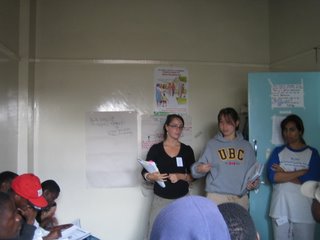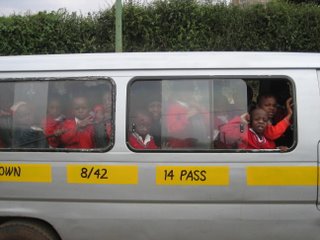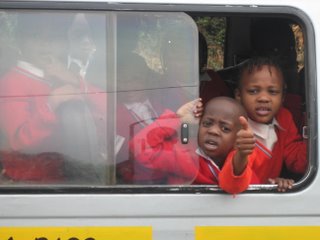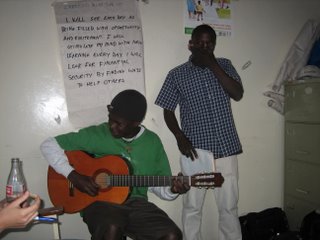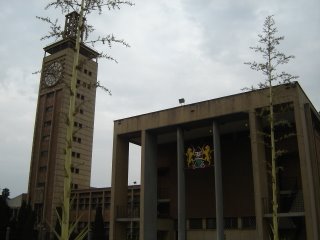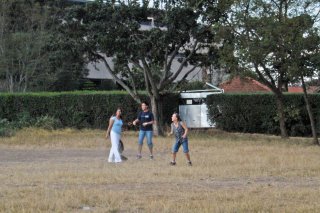Okay, so much has happened for the past couple of days.
Let's start with the Finance Workshop. To demonstrate the concept of supply and demand, Brit and Kathy brought in a cake and handed out different amounts of monopoly money to the class, and asked what price the students are willing to pay for the cake. Obviously, the more expensive it was, the less students are willing or able to afford the cake. Afterwards, we shared the cake and had a very happy break. It's also funny how the students loved the monopoly money and wouldn't give it back to us.
While we were waiting for the Matatu (minibus) to take us home, a busload full of kids in uniform stopped in front of us and started to chant, "How are you? How are you? How are you? How are you? How are you?" We chanted back, "We are fine. We are fine. We are fine."
Dead silence. I wonder if the kids know what they are saying.
Yesterday, we had our Marketing tutorial. Nancy Brit and Kathy went to meet with Microfinance firms while Eiston Alia Sarah and I went to the tutorial. We were expecting the four students of the intensive group to show up, but 15 ended up coming. Obviously, demand exceeds supply. We jumped from student to student and talked endless for 4 hours. I'm surprised none of us came back out with a sore throat. On that note, the youths' eagerness to learn really touches me. They do their homework with great attention and effort, while I'm sure none of us would have attended to our homework with such great detail. Their efforts and positive learning attitude really shines through.
On that note, I had some colourful Post-Its sticking out of my Resource book and the kids kept on pointing to them. I gave it to them and they started to stick it around the walls and around their foreheads and just smiled and laughed and chuckled. You should really see how they huddled around Eiston's camera to look at their own silly faces. They are such happy children. Materialism does corrupt people, eh?
So, after the morning session, Eiston Alia and I went to the Saturday market in the City Centre to look for souvenirs. Alia could totally pass for a local, and when the vendors approached her, she told them to talk to us because she has everything in her house. Well, the vendors definitely attacked us, telling us that, "She gave
permission to talk to you." Eiston and I were,
speechless. Haha, I mean, come talk to us, no permission needed. Anyway, as all that was happening, this man started to talk to Alia and totally ignored his business when two customers desparately tried to gain his attention. Well, Alia suddenly became hot in Africa. Throughout these 7 days, you have no idea how many guys tried to get her attention and offering to buy her drinks. The big story came when we were grocery shopping at Nakumatt today. The bagger (people who put our groceries in the bag) offered to pay her dowry. The conversation went like this:
Bagger: I want to steal her away from you.
Kathy: You can't steal her away. She's mine.
Bagger: I will pay for her dowry.
Kathy: You can't afford it.
Well, haha, we had an interesting conversation about how beauty standards here are so different from Canada's. But nonetheless, Alia is beautiful and hot
everywhere.
Well, Nancy had a marriage proposal already. Alia seems to be getting lots. I wonder if all of us are willing to leave this special place after our program is over.
Today... is Sunday. Well, currently we are in our Guesthouse with no running water. Apparently there is water shortage in the entire city.
We slept in for a bit, while Brit went for her animal counting connection building safari (I have ho idea what that is... but she refers to it as the
counting trip) and Sarah is off visiting her family friend, the rest of us with Nancy went to Bomas of Kenya to see the different huts of the tribes. To be honest, none of us can really tell the difference. Then we enjoyed almost two hours of African music and dance. I also wanted to say that Eiston and Brit are the best roommate because we are laughing in their room but they are both sleeping and oblivious to what's happening to the rest of the world.
Anyway, I think that's enough update for now. "Back to school" tomorrow eh?
Posted by Josephine Wong



